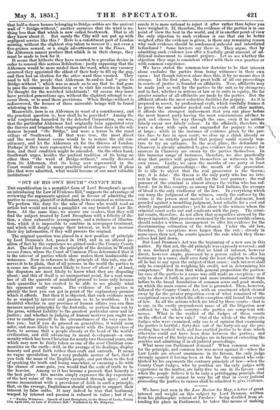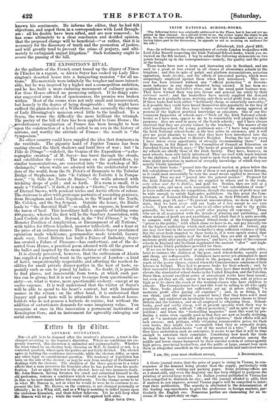"OUT OF HIS OWN MOUTH" CONVICT HIM.
THE republication in a pamphlet form of Lord Brougham's speech on introducing the Law of Evidence Bill,* suggests the advantage of reviewing the arguments against and in favour of admitting the parties to causes, plaintiff or defendant, to be examined as witnesses. We perform this duty for the sake of those who would read an article but would not read a pamphlet on any branch of Law Re- form. At the same time, we assure our readers, that they will find the subject treated by Lord Brougham with a felicity of dic- tion, a clear exhaustive arrangement, and a richness of illustra- tion, which it is impossible to combine in newspaper treatment, and which will deeply engage their interest, as well as increase their dry information, if they will procure the original.
The original question was placed in a new position of principle by Lord Denman's Act, passed in 1842, and in an altered po- sition of fact by the experience we gained under the County Courts Act. The old law stood on the principle of the decision in Worrall versus Jones, where the Court of Common Pleas determined that it is the interest of parties which alone makes them inadmissible as witnesses. Now in reference to the principle of this rule, one ob- serves it to be plain, that of all persons in the world the parties to a cause are the persons most likely to know all about it ; at least, the disputers are most likely to know what they are disputing about : and this of itself is no unimportant point, for a vast num- ber of all the quarrels of mankind proceed to issue only because each quarreller is too excited to be able to see plainly what his opponent really wants. The evidence of the parties is plainly the best you can get in point of the explanatory promise which it affords. But then it is objected, that such evidence must be so warped by interest and passion as to be worthless. It is doubtful whether in any province of human affairs you can thus measure moral principles by the foot-rule, or portion them out by the gross, without liability to the greatest particular error and in- justice ; and whether in judging of human motives you ought not ever to confine yourself to the circumstances of the very case be- fore you : but if you do proceed on generalities, it would seem safer, and more likely to be in agreement with the largest class of facts, to assume that a people already at the head of the world's civilization, and still advancing in moral development—a com- munity which has been Christian for nearly two thousand years, and which may now be fairly taken as one of the ?nost Christian com- munities on the earth—will, in the average of its dealings, display honesty and good faith rather than craft and untruth. It seems no vague speculation, but a very probable matter of fact, that if you took the mass of the English people, and put them to the test of speaking the truth and losing somewhat, or swearing a lie with the chance of some gain, you would find the scale of truth to be the heavier. Among us it has become a proverb that honesty is the best policy : this maxim simply expresses the dry experience of the best sense of the country exercised through ages ; and it seems inconsistent with a prevalence of faith in such a principle, that, on the average, Englishmen should attempt to support their interest by false oaths. It may indeed be true that testimony warped by interest and passion is reduced in value ; but if so, • "Parties Witnesses. Speech of Lord Brougham, in the Rouse of Lords, Friday llth April 1851, on Law of Evidence Bill." Published by Mr. Ridgway. surely it is more rational to reject it after rather than before you have weighed it. If, therefore, the evidence of the parties is in one point of view the best in the -world, and if in another point of view the only objection to such evidence is one that can be better weighed after the evidence is given, is there any remaining reason why such evidence should be condemned,unheard and interdicted beforehand ? Some lawyers say there is. They argue, that by admitting. such evidence you offer a fearfully great amount of ad- ditional inducement to commit perjury. Let us see whether the objection they urge is consistent either with their own practice or with common experience.
We have stated the common-law doctrine to be that interest alone excludes the parties from being witnesses in their own cause : but though interest alone does this' it by no means does it always. In the first place, the great bulk of all our proceedings in courts of justice is founded on affidavits. Now, affidavits may be made just as well by the parties to the suit as by strangers ; and in fact, whether in actions at law or in suits in equity, the far greater number of all affidavits are made by the parties. But the affidavit affords the most seductive facilities for perjury. As it is prepared in secret, by professional craft, which carefully frames it to prove the one matter needed and to evade all other matters, it affords the strongest inducement that you can place before the most honest party having the most conscientious ad r to pick and choose his way through the case, even if he nei er falsely swear nor falsely colour. In the affidavit, therefore, leave a door wide open and unguarded for perjury to enter at lame ; while in the instance a evidence given by the par- ties face to face in open court, we close up a chink already so strait and so strictly guarded that perjury could scarcely ven- ture to try an entrance. In the next place, the defendant in Chancery is already admitted to give evidence in every cause ; for
i answers n Chancery are sworn by the parties themselves. In this immense range of instances, therefore, we also practically deny that parties will perjure themselves as witnesses in their own cause. Lastly, we open the mouths of one party at least in all criminal proceedings — the mouth of the prosecutor. It is idle to object that the real prosecutor is the Queen ; nay, it is false : the Queen is the only party who has no inte- rest in the case. You cannot call her the real pursuer ; the real pursuer of the criminal is almost always the victim who has suf- fered : for in this country, as among the Red Indians, the avenger of blood is the only vindicator of the law. In everything which can warp the judgment of the witness, surely the sufferer by the crime is the person most moved to a coloured statement, least guarded against a trembling judgment, least reliable for a cool and strictly impartial narrative : yet he alone is the witness whom the criminal court seeks out and confronts with the jury. The crimi- nal courts, therefore, do not allow that sympathies aroused by the deepest injustice, that passions awakened by the most terrible crimes, should render a witness incompetent to offer his evidence for the discriminating estimation of the tribunal. Under the old law, therefore, the exceptions were larger than the rule ; already in more cases than not, the courts ignored the rule which they them- selves had laid down.
But Lord Denman's Act was the beginning of a new wra in this matter. By that act, the old principle was expressly reversed ; and it was declared generally, "that no kind of interest, however direct, however ample, possessed by a person called to offer his testimony in a cause, shall ever form the least objection to hearing all he has to say upon the subject of that cause : such interest shall only be considered in weighing his credit, not in determining his competence." But from that wide general proposition the particu- lar case of the parties to a cause was still made an exception ; as if only to show it forth in greater and more irrational contrast than before to the broad foundation of common sense and good morals, on which the main course of the law is grounded. Then, however, followed the County Courts Act, with an enactment which cleared away by far the greater proportion even of what remained of the exceptional cases in which the effete exception still bound the courts of law. In all the actions which are tried by those courts—that is to say, in the vastly preponderant mass of all the litigation now suffered by the whole country—the parties are competent wit- nesses. What is the verdict of the Judges of these courts on the effect of the new rule ? Out of the whole of the forty-six Judges who were examined, only one is of opinion that examining the parties is hurtful ; forty-five out of the forty-six say the pro- ceeding has worked well, and has enabled justice-to be done which otherwise could not have been done between the parties ; and forty-four out of the forty-six Judges are in favour of extending the practice and admitting it in all judicial proceedings.
What more can Parliament demand? When common sense is for the principle, and common law was never against it—when the Law Lords are almost unanimous in its favour, the only judge strongly against it having been at the bar the counsel who esta- blished by his arguments the contrary principle of law—when the County Court Judges, who by position are the only judges with experience in the matter, are forty-five to one in its favour—and when the people believe it to be only a pettifogging principle that opposes,—surely it cannot be very far off that in every judicial proceeding the parties to causes shall be admitted to give evidence.
We have and seen in the Law Review for May, a letter of 4Teat interest and weight on this subject by Lord Denman, written from his philosophic retreat at Parsloes : being disabled from at- tending his place in Parliament, he takes this means of making known his sentiments. He informs the editor, that he had felt objections, and urged them in a correspondence with Lord Brough- am: all his doubts have been sifted, and are now removed ; he has come ultimately to a clear conclusion and decided opinion, that the proposed change will be beneficial—" or rather, that it is necessary for the discovery of truth and the promotion of justice, and will greatly tend to prevent the crime of perjury, and ulti- mately to extinguish unjust litigation." Such testimony ought to secure the passing of the bill.



























 Previous page
Previous page